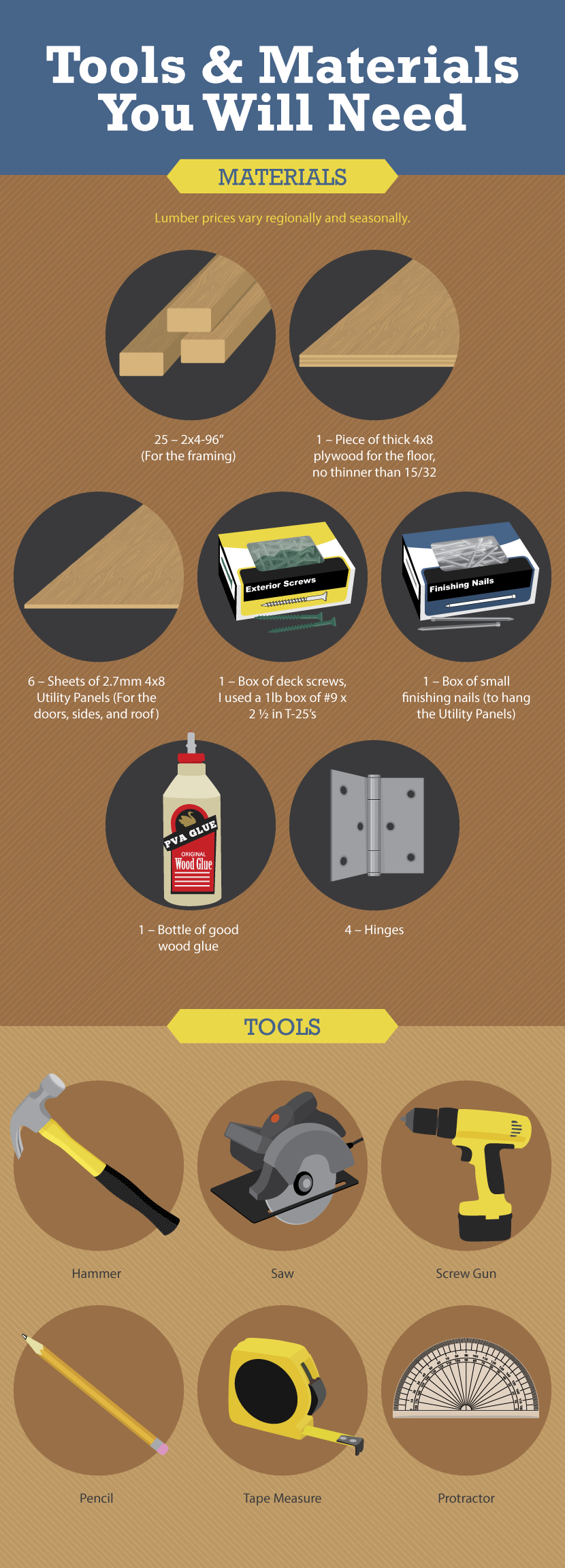Build a DIY Ice Fishing Shelter on a Budget

The Best $150 Ice Shanty Ever
Written by Joe Overlock
Keeping warm while ice fishing is next to impossible on some days, unless you have a good shelter. Many "pop-up" tent style shelters are available on the market, all of which have hefty price tags, but none equal the comfort of a home-built wooden shelter. The keys to keeping warm on the ice are getting your feet off the ice, getting out of the wind on sunny days, and using a portable heater on cold, windy, overcast days.
In this article, we'll show you how to build a light wooden shelter that will comfortably hold 2-3 anglers, that can function as a lean-to on sunny days, and that can close up tight on bitter cold days. This shelter uses an exoskeleton-style frame to give you more room on the inside and provide a smooth, snag-free interior for winter clothing.
Materials (note that lumber prices vary regionally and seasonally):
- 25 2' x 4' x 8' boards (for the framing)
- 1 piece of thick 4' x 8' plywood for the floor (no thinner than 15/32)
- 6 sheets of 2.7mm 4' x 8' utility panels (for the doors, sides, and roof)
- 1 box of deck screws (I used a 1-pound box of #9 x 2½" T-25s)
- 1 box of small finishing nails (to hang the utility panels)
- 1 bottle of good wood glue
-
4 hinges

Tools:
- Hammer
- Saw (whichever kind you own)
- Screw gun
- Pencil
- Tape measure
- Protractor
This is a straightforward build that requires no special tools beyond what most people own already. The only complicated tool you'll need is the protractor since you need a 26.5° angle for your roof pitch.

The Floor
Start by cutting five studs each to 45" in length. Next lay out two of the 2' x 4' x 8's parallel to each other. Space the five studs 24" apart, center to center, and screw them in place using the deck screws.
Next, nail some pieces of scrap wood about ½" thick and 8' long to the underside of the floor to function as runners on the snow and ice. If you plan on using a wood sealer, go ahead and apply it to this area now.
Flip the floor frame and attach the thick sheet of plywood using the deck screws.
Back Wall Supports
Cut five 2' x 4' x 8's total. All should be 52" in length with a 26.5° angle at the top. Attach these along the back wall, spaced 24" apart center to center. Make sure your two corner boards do NOT overlap the sides of the floor.
Two Side Wall Supports
Cut two 2' x 4' x 8's to a total length of 52?" with a 26.5° angle on one side. Square these up with the back supports and fasten with deck screws.
Cut two 2' x 4' x 8's to a total length of 75" with the 26.5° angle at the top. Attach them to the floor frame, but do not allow them to overlap to the front.
Front Door Supports
Cut two 2' x 4' x 8's to a total length of 75¾" with the 26.5° angle at the top. Square up with the two wall supports, and use deck screws to attach them.
Cut a 26.5° angle across the side of an entire 2' x 4' x 8'; this is your top span. Square up and attach with deck screws.
Roof Supports
Cut five 2' x 4' x 8's to a total length of 56½". No angle is needed. Square up and attach with deck screws.

Doors
Cut two 4' x 8' panels to 4' x 6' each. You can choose a few different ways to frame the door. Either use 2' x 4' x 8's or split the 2' x 4' x 8's with a table saw into 2' x 2's to save weight on the door. Attach hinges and mount to doorframe.
Panels
Attach all the panels using the wood glue and finishing nails. The back panel should fall right into place with no cutting needed. The roof will take a full panel plus some scrap strips cut from the door to fill in the last few inches of the slope. The two sidewalls should be measured and cut carefully. Each side will be slightly different due to wood warping, but in general they should be 6' x 4' x 4' with a 26.5° slope.

Final Touches
At this point, feel free to apply any weather-sealing products and paint you like; the better they are, the longer your lean-to will last. You should also go around all the edges with some silicone caulk and seal up any spots where wind and rain can get in.
This is a fun project that one person can easily do over a weekend. It can function as a lean-to on sunny winter days to help break the wind and get your feet off the ice or as a complete shelter for lousy days. You can customize and modify this design to your liking. Feel free to send us pictures of your buildings, modifications, and catches on Twitter at @FlyFishExaminer and @FixDotCom.

